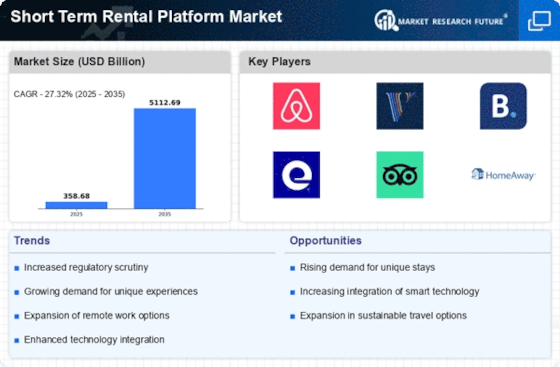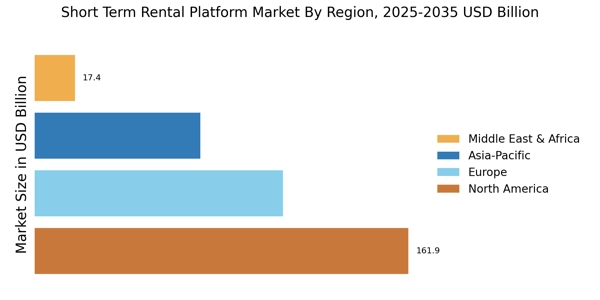Regulatory Changes
Regulatory changes are shaping the landscape of the Short Term Rental Platform Market, as governments worldwide implement new policies to manage the growth of short term rentals. These regulations often aim to address concerns related to housing availability, safety, and taxation. For instance, some cities have introduced licensing requirements and restrictions on the number of days properties can be rented. While these regulations may pose challenges for some platforms, they also create opportunities for compliance-focused businesses to thrive. The ability to navigate these regulatory environments effectively can provide a competitive advantage in the Short Term Rental Platform Market. As regulations continue to evolve, platforms that prioritize transparency and compliance are likely to gain consumer trust and foster long-term sustainability.
Increased Travel Demand
The Short Term Rental Platform Market is experiencing a surge in travel demand, driven by a growing preference for unique and personalized accommodation experiences. As travelers increasingly seek alternatives to traditional hotels, short term rentals offer diverse options that cater to various budgets and preferences. According to recent data, the short term rental market has seen a compound annual growth rate of approximately 7.5%, indicating a robust expansion. This trend is further fueled by the rise of remote work, allowing individuals to travel more frequently and for extended periods. Consequently, the demand for short term rentals is likely to continue its upward trajectory, as consumers prioritize flexibility and local experiences over conventional lodging. This shift in consumer behavior is reshaping the landscape of the Short Term Rental Platform Market.
Sustainability Initiatives
Sustainability initiatives are becoming increasingly relevant within the Short Term Rental Platform Market, as consumers demonstrate a growing preference for eco-friendly accommodations. Many travelers are now seeking properties that implement sustainable practices, such as energy-efficient appliances, waste reduction strategies, and local sourcing of materials. This shift is prompting rental platforms to highlight sustainable options in their listings, catering to environmentally conscious consumers. Data indicates that approximately 70% of travelers are willing to pay more for eco-friendly accommodations, suggesting a lucrative market segment for platforms that prioritize sustainability. As awareness of environmental issues continues to rise, the Short Term Rental Platform Market is likely to see a greater emphasis on sustainable practices, influencing both consumer choices and platform offerings.
Technological Advancements
Technological advancements play a pivotal role in the evolution of the Short Term Rental Platform Market. The integration of sophisticated booking systems, mobile applications, and data analytics has transformed how consumers interact with rental platforms. Enhanced user experiences, facilitated by seamless payment options and real-time availability updates, have become essential in attracting and retaining customers. Furthermore, the implementation of artificial intelligence and machine learning algorithms allows platforms to personalize recommendations, thereby increasing customer satisfaction. As technology continues to evolve, it is anticipated that the Short Term Rental Platform Market will further embrace innovations that streamline operations and enhance user engagement. This technological integration not only improves operational efficiency but also positions platforms to better meet the evolving demands of travelers.
Changing Consumer Preferences
The Short Term Rental Platform Market is significantly influenced by changing consumer preferences, particularly among millennials and Generation Z. These demographics prioritize experiences over material possessions, leading to a heightened interest in unique and immersive travel accommodations. Short term rentals, which often provide local insights and authentic experiences, align well with these preferences. Data suggests that approximately 60% of younger travelers prefer short term rentals for their flexibility and the opportunity to engage with local cultures. This shift in consumer behavior is prompting rental platforms to adapt their offerings, focusing on unique properties and personalized services. As these preferences continue to evolve, the Short Term Rental Platform Market is likely to see an increase in demand for innovative and experience-driven rental options.

















